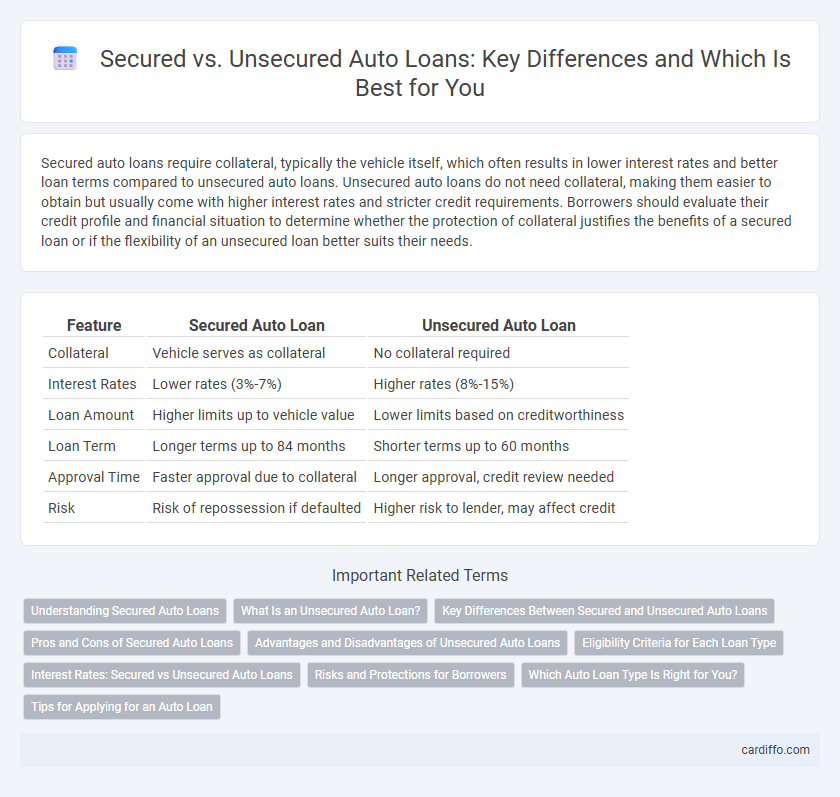Secured auto loans require collateral, typically the vehicle itself, which often results in lower interest rates and better loan terms compared to unsecured auto loans. Unsecured auto loans do not need collateral, making them easier to obtain but usually come with higher interest rates and stricter credit requirements. Borrowers should evaluate their credit profile and financial situation to determine whether the protection of collateral justifies the benefits of a secured loan or if the flexibility of an unsecured loan better suits their needs.
Table of Comparison
| Feature | Secured Auto Loan | Unsecured Auto Loan |
|---|---|---|
| Collateral | Vehicle serves as collateral | No collateral required |
| Interest Rates | Lower rates (3%-7%) | Higher rates (8%-15%) |
| Loan Amount | Higher limits up to vehicle value | Lower limits based on creditworthiness |
| Loan Term | Longer terms up to 84 months | Shorter terms up to 60 months |
| Approval Time | Faster approval due to collateral | Longer approval, credit review needed |
| Risk | Risk of repossession if defaulted | Higher risk to lender, may affect credit |
Understanding Secured Auto Loans
Secured auto loans require borrowers to use the vehicle as collateral, lowering the lender's risk and often resulting in lower interest rates compared to unsecured loans. These loans typically involve a lien on the car, which the lender can repossess if the borrower defaults on payments. Understanding the terms, such as loan-to-value ratio and potential repossession consequences, helps borrowers choose between secured and unsecured auto financing options.
What Is an Unsecured Auto Loan?
An unsecured auto loan does not require collateral, meaning the vehicle or other assets are not pledged as security for the loan. Interest rates on unsecured auto loans are typically higher than secured loans due to increased lender risk. Borrowers with strong credit histories are more likely to qualify for favorable terms on unsecured auto loans.
Key Differences Between Secured and Unsecured Auto Loans
Secured auto loans require collateral, typically the vehicle itself, which reduces lender risk and often results in lower interest rates compared to unsecured auto loans that do not require collateral. Unsecured auto loans rely solely on the borrower's creditworthiness, leading to higher interest rates and stricter approval criteria. The key differences include interest rates, loan limits, risk to the borrower, and potential repossession in case of default for secured loans.
Pros and Cons of Secured Auto Loans
Secured auto loans offer lower interest rates and higher borrowing limits since the vehicle serves as collateral, reducing lender risk. However, they carry the risk of repossession if loan payments are missed, potentially leading to loss of the car. These loans also require a good credit score to qualify for the best terms and often involve longer approval processes compared to unsecured loans.
Advantages and Disadvantages of Unsecured Auto Loans
Unsecured auto loans require no collateral, reducing the risk of vehicle repossession if payments are missed, and they typically have faster approval processes. However, they often come with higher interest rates compared to secured loans due to increased lender risk and may have lower borrowing limits. Borrowers with strong credit profiles benefit most from unsecured auto loans, while those with weaker credit might face stricter terms or loan denials.
Eligibility Criteria for Each Loan Type
Secured auto loans require the borrower to provide the vehicle as collateral, typically necessitating a stable credit score of 600 or higher and proof of consistent income to ensure repayment capability. Unsecured auto loans do not require collateral, but they demand higher credit scores, often above 700, and stricter income verification due to increased lender risk. Lenders also assess debt-to-income ratio and employment history for both loan types, with secured loans generally offering more flexible eligibility standards.
Interest Rates: Secured vs Unsecured Auto Loans
Secured auto loans typically offer lower interest rates because the vehicle serves as collateral, reducing the lender's risk. Unsecured auto loans have higher interest rates since they rely solely on the borrower's creditworthiness without collateral protection. Borrowers with strong credit profiles may still secure competitive rates on unsecured loans, but overall, secured loans remain more cost-effective.
Risks and Protections for Borrowers
Secured auto loans pose the risk of vehicle repossession if borrowers default, but they typically offer lower interest rates due to collateral reducing lender risk. Unsecured auto loans eliminate the risk of losing the car but often carry higher interest rates and stricter credit requirements, increasing borrower financial burden. Borrowers benefit from secured loans' protections like potential refinancing options, while unsecured loans demand careful budgeting to avoid severe credit damage from missed payments.
Which Auto Loan Type Is Right for You?
Secured auto loans require collateral, such as the vehicle itself, often resulting in lower interest rates and higher approval chances compared to unsecured auto loans, which do not require collateral but typically come with higher rates and stricter credit requirements. Choosing the right auto loan depends on your credit score, financial stability, and risk tolerance; if you can provide collateral and want lower monthly payments, a secured loan is advantageous. For borrowers with strong credit who prefer not to risk their vehicle, unsecured auto loans offer flexibility despite higher costs and shorter loan terms.
Tips for Applying for an Auto Loan
When applying for a secured auto loan, ensure your credit score is strong and use the vehicle as collateral to potentially secure lower interest rates. For unsecured auto loans, emphasize stable income and reduce existing debts to improve loan approval chances despite higher interest rates. Comparing lender terms and pre-approving your loan application can streamline the process and provide better financial clarity.
Secured Auto Loan vs Unsecured Auto Loan Infographic

 cardiffo.com
cardiffo.com